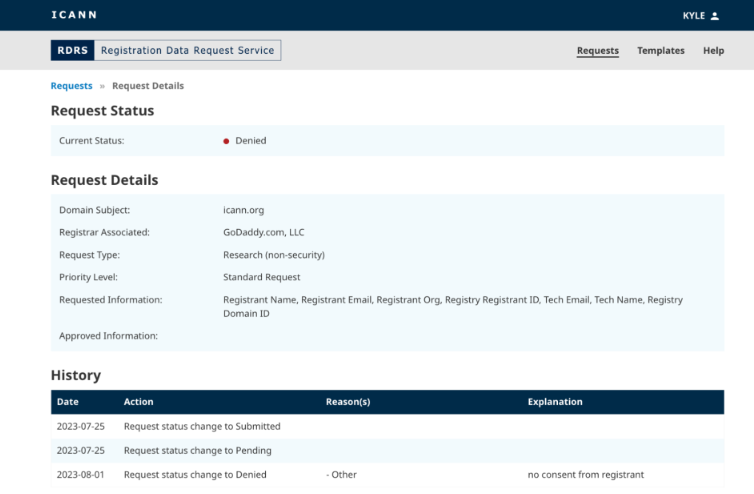[ad_1]
Greater than 5 years after area title registrars began redacting private knowledge from all public area registration information, the non-profit group overseeing the area trade has launched a centralized on-line service designed to make it simpler for researchers, legislation enforcement and others to request the data straight from registrars.

In Might 2018, the Web Company for Assigned Names and Numbers (ICANN) — the nonprofit entity that manages the worldwide area title system — instructed all registrars to redact the client’s title, tackle, telephone quantity and electronic mail from WHOIS, the system for querying databases that retailer the registered customers of domains and blocks of Web tackle ranges.
ICANN made the coverage change in response to the Basic Knowledge Safety Regulation (GDPR), a legislation enacted by the European Parliament that requires corporations to realize affirmative consent for any private info they acquire on folks throughout the European Union. Within the meantime, registrars had been to proceed accumulating the information however not publish it, and ICANN promised it could develop a system that facilitates entry to this info.
On the finish of November 2023, ICANN launched the Registration Knowledge Request Service (RDRS), which is designed as a one-stop store to submit registration knowledge requests to collaborating registrars. This video from ICANN walks by means of how the system works.
Accredited registrars don’t must take part, however ICANN is asking all registrars to affix and says contributors can choose out or cease utilizing it at any time. ICANN contends that using a standardized request kind makes it simpler for the right info and supporting paperwork to be supplied to guage a request.
ICANN says the RDRS doesn’t assure entry to requested registration knowledge, and that each one communication and knowledge disclosure between the registrars and requestors takes place outdoors of the system. The service can’t be used to request WHOIS knowledge tied to country-code prime stage domains (CCTLDs), resembling these ending in .de (Germany) or .nz (New Zealand), for instance.

The RDRS portal.
As Catalin Cimpanu writes for Dangerous Enterprise Information, at the moment investigators can file authorized requests or abuse experiences with every particular person registrar, however the concept behind the RDRS is to create a spot the place requests from “verified” events will be honored sooner and with the next diploma of belief.
The registrar group typically views public WHOIS knowledge as a nuisance concern for his or her area clients and an unwelcome cost-center. Privateness advocates preserve that cybercriminals don’t present their actual info in registration information anyway, and that requiring WHOIS knowledge to be public merely causes area registrants to be pestered by spammers, scammers and stalkers.
In the meantime, safety specialists argue that even in instances the place on-line abusers present deliberately deceptive or false info in WHOIS information, that info continues to be extraordinarily helpful in mapping the extent of their malware, phishing and scamming operations. What’s extra, the overwhelming majority of phishing is carried out with the assistance of compromised domains, and the first methodology for cleansing up these compromises is utilizing WHOIS knowledge to contact the sufferer and/or their internet hosting supplier.
Anybody on the lookout for copious examples of each want solely to search this Site for the time period “WHOIS,” which yields dozens of tales and investigations that merely wouldn’t have been attainable with out the information out there within the international WHOIS information.
KrebsOnSecurity stays uncertain that collaborating registrars will likely be any extra prone to share WHOIS knowledge with researchers simply because the request comes by means of ICANN. However I sit up for being unsuitable on this one, and will definitely point out it in my reporting if the RDRS proves helpful.
No matter whether or not the RDRS succeeds or fails, there may be one other European legislation that takes impact in 2024 which is prone to place extra stress on registrars to answer authentic WHOIS knowledge requests. The brand new Community and Data Safety Directive (NIS2), which EU member states have till October 2024 to implement, requires registrars to maintain rather more correct WHOIS information, and to reply inside as little as 24 hours to WHOIS knowledge requests tied every part from phishing, malware and spam to copyright and model enforcement.
[ad_2]


